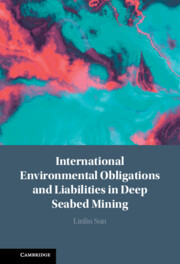Book contents
- International Environmental Obligations and Liabilities in Deep Seabed Mining
- International Environmental Obligations and Liabilities in Deep Seabed Mining
- Copyright page
- Dedication
- Contents
- Foreword
- Preface
- Acknowledgements
- Abbreviations
- 1 Introduction
- 2 Common Heritage of Mankind and Protection of the Marine Environment
- 3 International Seabed Authority and Its Environmental Mandate
- 4 International Environmental Obligations of the Sponsoring State and Contractor
- 5 Definition and Measure of Marine Environmental Damage
- 6 International Environmental Liability of the Contractor
- 7 Alternatives to International Environmental Liability of the Contractor
- 8 International Environmental Liabilities of the Sponsoring State and the International Seabed Authority
- 9 Conclusions
- Bibliography
- Index
9 - Conclusions
Published online by Cambridge University Press: 09 November 2023
- International Environmental Obligations and Liabilities in Deep Seabed Mining
- International Environmental Obligations and Liabilities in Deep Seabed Mining
- Copyright page
- Dedication
- Contents
- Foreword
- Preface
- Acknowledgements
- Abbreviations
- 1 Introduction
- 2 Common Heritage of Mankind and Protection of the Marine Environment
- 3 International Seabed Authority and Its Environmental Mandate
- 4 International Environmental Obligations of the Sponsoring State and Contractor
- 5 Definition and Measure of Marine Environmental Damage
- 6 International Environmental Liability of the Contractor
- 7 Alternatives to International Environmental Liability of the Contractor
- 8 International Environmental Liabilities of the Sponsoring State and the International Seabed Authority
- 9 Conclusions
- Bibliography
- Index
Summary
The principle of common heritage of mankind (CHM) is the basic tenet of the deep seabed mining (DSM) legal regime which requires that DSM activities serve community interests. It is argued that the principle of CHM is not and will not become outdated not only because of Article 311(6) of the United Nations Convention on the Law of the Sea (UNCLOS), but more importantly because of the discernible trend of community interests in international law. The marine environmental protection in DSM as a restrictive element of CHM is one specific manifestation of community interests (Chapter 2). The overall objective of this book is to ascertain how the participants in DSM operationalize the principle of CHM by exercising environmental powers and rights, complying with environmental obligations and assuming environmental liabilities at the international level. It argues that political as well as legal discourses over the future development of the DSM legal regime must be subject to the community interests test.
- Type
- Chapter
- Information
- Publisher: Cambridge University PressPrint publication year: 2023

